牛津译林版(2019)必修第二册Unit 4 Exploring Literature Grammar and usage课件(共22张PPT)
文档属性
| 名称 | 牛津译林版(2019)必修第二册Unit 4 Exploring Literature Grammar and usage课件(共22张PPT) | 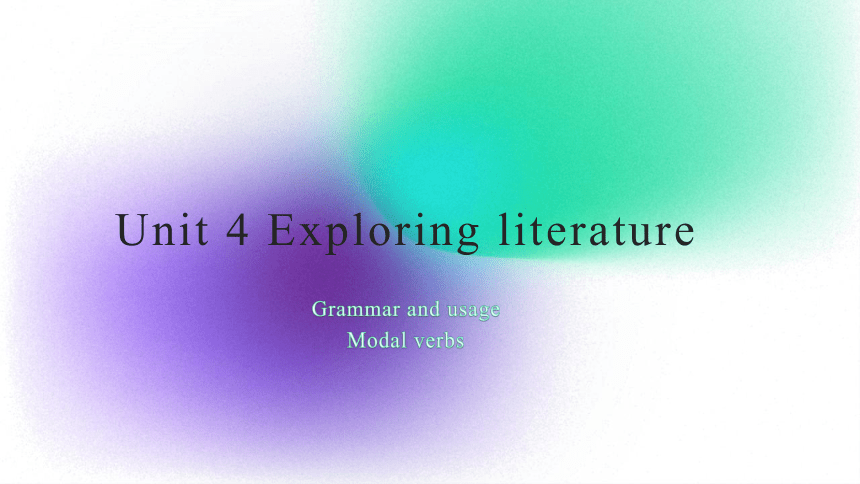 | |
| 格式 | zip | ||
| 文件大小 | 49.0MB | ||
| 资源类型 | 教案 | ||
| 版本资源 | 牛津译林版(2019) | ||
| 科目 | 英语 | ||
| 更新时间 | 2022-12-27 17:19:52 | ||
图片预览

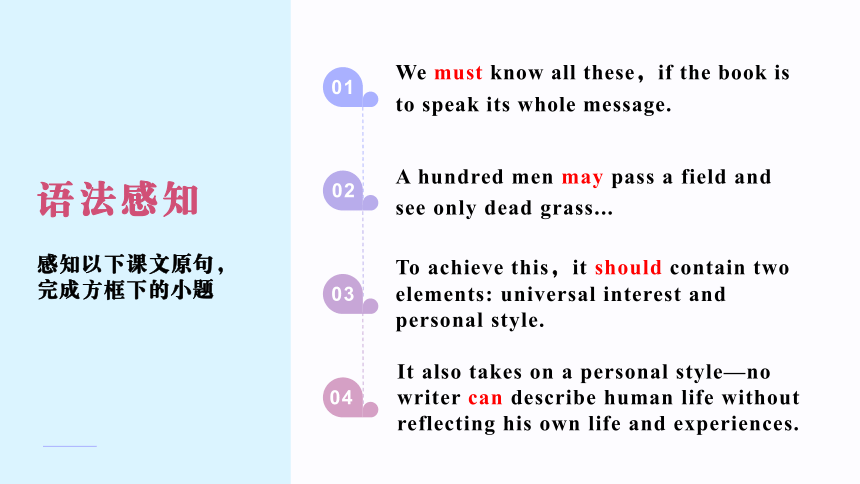
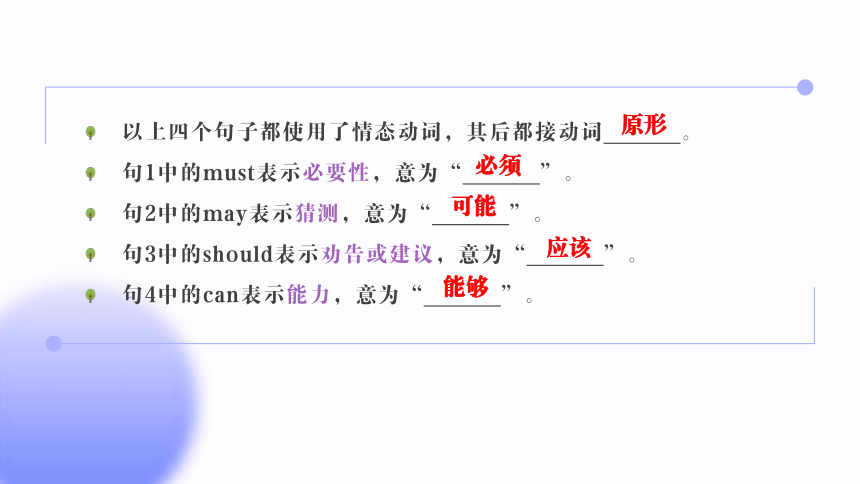
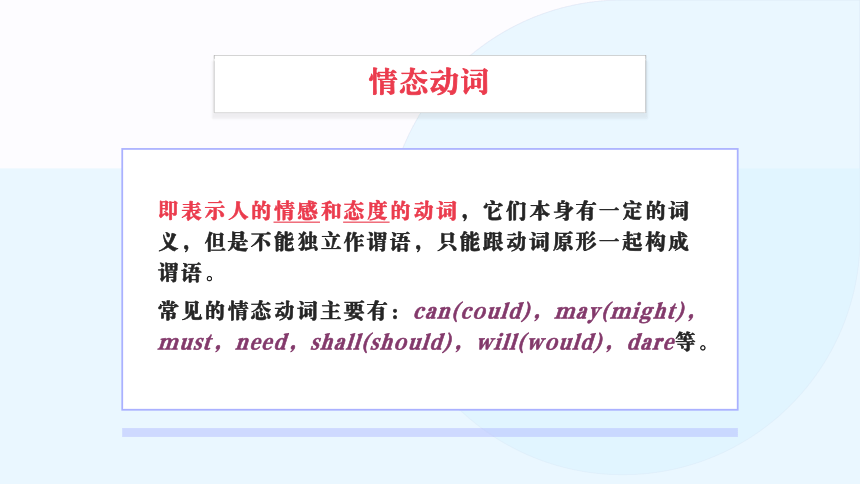
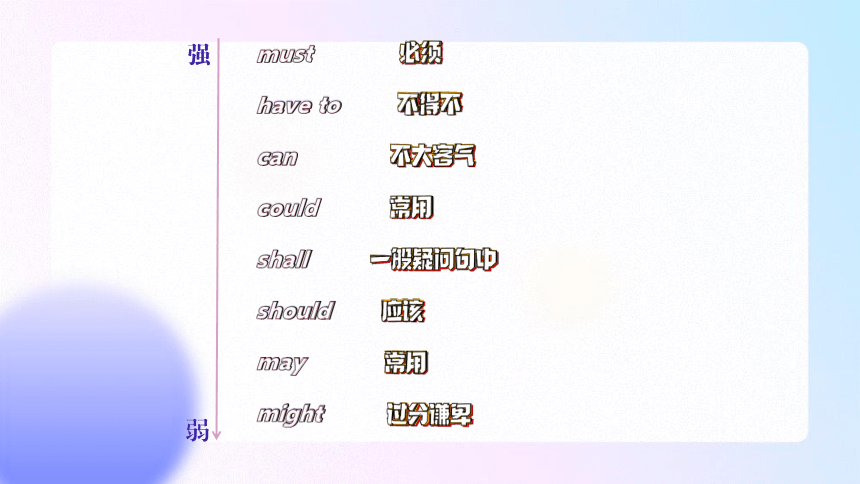

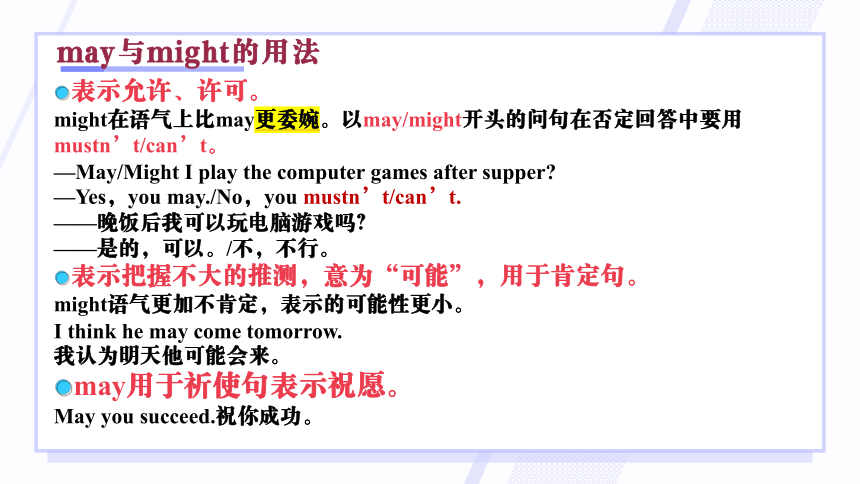

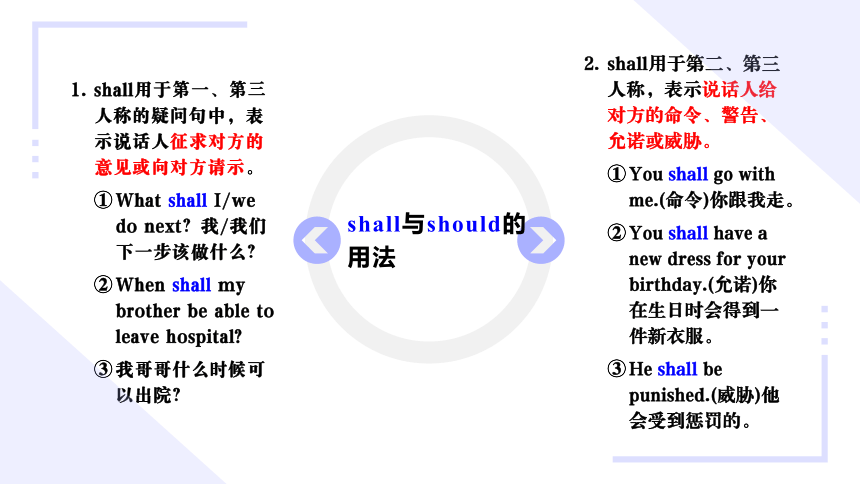
文档简介
(共22张PPT)
Unit 4 Exploring literature
Grammar and usage
Modal verbs
语法感知
感知以下课文原句,完成方框下的小题
We must know all these,if the book is to speak its whole message.
A hundred men may pass a field and see only dead grass...
To achieve this,it should contain two elements: universal interest and personal style.
It also takes on a personal style—no writer can describe human life without reflecting his own life and experiences.
01
02
03
04
以上四个句子都使用了情态动词,其后都接动词 。
句1中的must表示必要性,意为“ ”。
句2中的may表示猜测,意为“ ”。
句3中的should表示劝告或建议,意为“ ”。
句4中的can表示能力,意为“ ”。
原形
必须
可能
应该
能够
情态动词
即表示人的情感和态度的动词,它们本身有一定的词义,但是不能独立作谓语,只能跟动词原形一起构成谓语。
常见的情态动词主要有:can(could),may(might),must,need,shall(should),will(would),dare等。
强
弱
must 必须
have to 不得不
can 不大客气
could 常用
shall 一般疑问句中
should 应该
may 常用
might 过分谦卑
can与could的用法
表示能力(could是过去时)。
My grandmother can do some shopping on the Internet,but she couldn’t last year.
我奶奶会网购了,但是去年她还不会。
表示猜测,意为“可能”,一般用于疑问句和否定句(could是过去时)。
Jim can’t stay in the library.(Jim不可能呆在图书馆)
表示请求和许可(could表示更委婉的语气,回答时只能用can)。
—Can/Could I go now
—Yes,you can.
——我现在可以走了吗?
——是的,可以。
表示允许、许可。
might在语气上比may更委婉。以may/might开头的问句在否定回答中要用mustn’t/can’t。
—May/Might I play the computer games after supper
—Yes,you may./No,you mustn’t/can’t.
——晚饭后我可以玩电脑游戏吗?
——是的,可以。/不,不行。
表示把握不大的推测,意为“可能”,用于肯定句。
might语气更加不肯定,表示的可能性更小。
I think he may come tomorrow.
我认为明天他可能会来。
may用于祈使句表示祝愿。
May you succeed.祝你成功。
may与might的用法
will与would的用法
表示意志、意愿和决心。用于各种人称,will指现在,would指过去。
I will never do that again.我再也不那样做了。
表示征求意见,提出请求。用于第二人称的疑问句,would表示更委婉的语气。
Will/Would you please take a message for me 你能帮我捎个口信吗?
表示习惯性的动作,意为“总是;习惯于”。will指现在,would指过去。
Fish will die without water.没有水鱼儿就会死。
表示推测,will推测现在/would推测过去,其推测程度略低于must。
This bus will hold 40 people.
That would be in 1978,I think.
shall用于第二、第三人称,表示说话人给对方的命令、警告、允诺或威胁。
You shall go with me.(命令)你跟我走。
You shall have a new dress for your birthday.(允诺)你在生日时会得到一件新衣服。
He shall be punished.(威胁)他会受到惩罚的。
shall用于第一、第三人称的疑问句中,表示说话人征求对方的意见或向对方请示。
What shall I/we do next?我/我们下一步该做什么?
When shall my brother be able to leave hospital
我哥哥什么时候可以出院?
shall与should的用法
1
should:
表示责任、义务、劝告、建议等,意为“应该;应当”
We should respect our teachers and parents.
表示惊讶、愤怒、失望等情绪,意为“竟然”
It‘s strange that you should say that.
表示可能性,说话者具有一定的推测,常译为“按道理说应该”
It should be a nice day tomorrow.
ought to
ought to与should的用法基本相同,意为“应当,应该”,表示责任、义务、劝告、可能性等。语气比should强。
We ought to protect wild animals.(表责任、义务)
The weather ought to improve after the week.(推测)
must的用法
01
表示“必须”,语气比should,ought to强烈。其否定形式为mustn’t (不准,禁止)。
You mustn’t do that,because you must keep your word.你不能那么做,因为你得遵守诺言。
02
表示推测,意为“一定,肯定”,指说话人有根据、有把握地推测。
Jack and Dick must be twins.They look so much alike.
表示“偏要”,“非要”:主要指令人不愉快的事情发生。
Why must you always interrupt me?
表示强调:表示说话者坚定的态度。
I must say that you’re looking extremely well.
表示必然的结果。
All men must die.
考点警示
以must开头的一般疑问句的肯定回答中要用must,否定回答中要用needn’t/don’t have to。
—Must I finish the paper today
—Yes,you must./No,you needn’t/don’t have to.
——我必须今天完成论文吗?
——是的,你必须。 /不,你不必。
must和have to的区别
must have to
强调主观看法 不得不(客观)
肯定:must do 肯定:have/has/had to do,will have to do
否定:needn‘t do don’t/doesn’t/didn’t/won’t have to do
need的用法
need既可以作实义动词,也可以作情态动词。
作情态动词时,后跟动词原形,表示“需要,有必要”,无人称和数的变化,多用于否定句、疑问句或条件句中。
You needn’t go there now.你现在不必去那儿。
Need I go there now?我现在需要去那儿吗?
You need go.(×)
You need to go.(√)
need后面的不定式,带to是“实义动词”,不带“to”是情态动词。情态动词need不能用于肯定句,只能用于否定句和疑问句。
考点警示
由need引起的一般疑问句的肯定回答常用must或have to;否定回答常用needn’t。
—Need I wash my clothes now
—Yes,you must/have to./No,you needn’t.
——我现在需要洗我的衣服吗?
——是的,你必须。/不,你不需要。
dare的用法
dare既可以作实义动词,也可以作情态动词。
dare作情态动词时,多用于疑问句、否定句、条件状语从句以及表示怀疑的名词性从句中,表示“敢……”。
I dare not walk through the wood at night.夜间我不敢在小树林里走。
dare作实义动词时,在否定句和疑问句中不定式符号to也可以省略。
The children don’t dare (to) make a sound while their parents are sleeping.
孩子们在父母睡觉时不敢弄出一点声音。
need 需要
dare 敢
做情态动词
无三单变化
否定后+not
后+动词原形
做实义动词
有三单变化
否定前+don’t/doesn’t/didn’t
后+to do
need和dare
既可作情态动词
也可做实义动词
She needn’t do her housework.(情态动词)
She needs to do her housework.(实义动词)
现将用动原,过去用完成
情态动词后表现在时和将来时,用动词原形do;表过去时,用完成时have done
must have done 一定做过了某事
should have done 本该做……(但没做)
shouldn’t have done 本不该做(但做了)
needn‘t have done 本不必做 (但做了)
can’t have done 不可能做了某事
could have done 本来能做成……(但没做成)
couldn’t have done 本不能做(却做了)
Thanks!
Unit 4 Exploring literature
Grammar and usage
Modal verbs
语法感知
感知以下课文原句,完成方框下的小题
We must know all these,if the book is to speak its whole message.
A hundred men may pass a field and see only dead grass...
To achieve this,it should contain two elements: universal interest and personal style.
It also takes on a personal style—no writer can describe human life without reflecting his own life and experiences.
01
02
03
04
以上四个句子都使用了情态动词,其后都接动词 。
句1中的must表示必要性,意为“ ”。
句2中的may表示猜测,意为“ ”。
句3中的should表示劝告或建议,意为“ ”。
句4中的can表示能力,意为“ ”。
原形
必须
可能
应该
能够
情态动词
即表示人的情感和态度的动词,它们本身有一定的词义,但是不能独立作谓语,只能跟动词原形一起构成谓语。
常见的情态动词主要有:can(could),may(might),must,need,shall(should),will(would),dare等。
强
弱
must 必须
have to 不得不
can 不大客气
could 常用
shall 一般疑问句中
should 应该
may 常用
might 过分谦卑
can与could的用法
表示能力(could是过去时)。
My grandmother can do some shopping on the Internet,but she couldn’t last year.
我奶奶会网购了,但是去年她还不会。
表示猜测,意为“可能”,一般用于疑问句和否定句(could是过去时)。
Jim can’t stay in the library.(Jim不可能呆在图书馆)
表示请求和许可(could表示更委婉的语气,回答时只能用can)。
—Can/Could I go now
—Yes,you can.
——我现在可以走了吗?
——是的,可以。
表示允许、许可。
might在语气上比may更委婉。以may/might开头的问句在否定回答中要用mustn’t/can’t。
—May/Might I play the computer games after supper
—Yes,you may./No,you mustn’t/can’t.
——晚饭后我可以玩电脑游戏吗?
——是的,可以。/不,不行。
表示把握不大的推测,意为“可能”,用于肯定句。
might语气更加不肯定,表示的可能性更小。
I think he may come tomorrow.
我认为明天他可能会来。
may用于祈使句表示祝愿。
May you succeed.祝你成功。
may与might的用法
will与would的用法
表示意志、意愿和决心。用于各种人称,will指现在,would指过去。
I will never do that again.我再也不那样做了。
表示征求意见,提出请求。用于第二人称的疑问句,would表示更委婉的语气。
Will/Would you please take a message for me 你能帮我捎个口信吗?
表示习惯性的动作,意为“总是;习惯于”。will指现在,would指过去。
Fish will die without water.没有水鱼儿就会死。
表示推测,will推测现在/would推测过去,其推测程度略低于must。
This bus will hold 40 people.
That would be in 1978,I think.
shall用于第二、第三人称,表示说话人给对方的命令、警告、允诺或威胁。
You shall go with me.(命令)你跟我走。
You shall have a new dress for your birthday.(允诺)你在生日时会得到一件新衣服。
He shall be punished.(威胁)他会受到惩罚的。
shall用于第一、第三人称的疑问句中,表示说话人征求对方的意见或向对方请示。
What shall I/we do next?我/我们下一步该做什么?
When shall my brother be able to leave hospital
我哥哥什么时候可以出院?
shall与should的用法
1
should:
表示责任、义务、劝告、建议等,意为“应该;应当”
We should respect our teachers and parents.
表示惊讶、愤怒、失望等情绪,意为“竟然”
It‘s strange that you should say that.
表示可能性,说话者具有一定的推测,常译为“按道理说应该”
It should be a nice day tomorrow.
ought to
ought to与should的用法基本相同,意为“应当,应该”,表示责任、义务、劝告、可能性等。语气比should强。
We ought to protect wild animals.(表责任、义务)
The weather ought to improve after the week.(推测)
must的用法
01
表示“必须”,语气比should,ought to强烈。其否定形式为mustn’t (不准,禁止)。
You mustn’t do that,because you must keep your word.你不能那么做,因为你得遵守诺言。
02
表示推测,意为“一定,肯定”,指说话人有根据、有把握地推测。
Jack and Dick must be twins.They look so much alike.
表示“偏要”,“非要”:主要指令人不愉快的事情发生。
Why must you always interrupt me?
表示强调:表示说话者坚定的态度。
I must say that you’re looking extremely well.
表示必然的结果。
All men must die.
考点警示
以must开头的一般疑问句的肯定回答中要用must,否定回答中要用needn’t/don’t have to。
—Must I finish the paper today
—Yes,you must./No,you needn’t/don’t have to.
——我必须今天完成论文吗?
——是的,你必须。 /不,你不必。
must和have to的区别
must have to
强调主观看法 不得不(客观)
肯定:must do 肯定:have/has/had to do,will have to do
否定:needn‘t do don’t/doesn’t/didn’t/won’t have to do
need的用法
need既可以作实义动词,也可以作情态动词。
作情态动词时,后跟动词原形,表示“需要,有必要”,无人称和数的变化,多用于否定句、疑问句或条件句中。
You needn’t go there now.你现在不必去那儿。
Need I go there now?我现在需要去那儿吗?
You need go.(×)
You need to go.(√)
need后面的不定式,带to是“实义动词”,不带“to”是情态动词。情态动词need不能用于肯定句,只能用于否定句和疑问句。
考点警示
由need引起的一般疑问句的肯定回答常用must或have to;否定回答常用needn’t。
—Need I wash my clothes now
—Yes,you must/have to./No,you needn’t.
——我现在需要洗我的衣服吗?
——是的,你必须。/不,你不需要。
dare的用法
dare既可以作实义动词,也可以作情态动词。
dare作情态动词时,多用于疑问句、否定句、条件状语从句以及表示怀疑的名词性从句中,表示“敢……”。
I dare not walk through the wood at night.夜间我不敢在小树林里走。
dare作实义动词时,在否定句和疑问句中不定式符号to也可以省略。
The children don’t dare (to) make a sound while their parents are sleeping.
孩子们在父母睡觉时不敢弄出一点声音。
need 需要
dare 敢
做情态动词
无三单变化
否定后+not
后+动词原形
做实义动词
有三单变化
否定前+don’t/doesn’t/didn’t
后+to do
need和dare
既可作情态动词
也可做实义动词
She needn’t do her housework.(情态动词)
She needs to do her housework.(实义动词)
现将用动原,过去用完成
情态动词后表现在时和将来时,用动词原形do;表过去时,用完成时have done
must have done 一定做过了某事
should have done 本该做……(但没做)
shouldn’t have done 本不该做(但做了)
needn‘t have done 本不必做 (但做了)
can’t have done 不可能做了某事
could have done 本来能做成……(但没做成)
couldn’t have done 本不能做(却做了)
Thanks!
